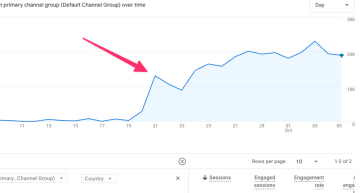Buying and using domain names with hyphens.
Quick Summary of Contents
- 0.1 The don’t ever buy a domain with a hyphen camp…
- 0.2 The use of hyphens is like breathing camp…
- 0.3 The hit-or-miss hyphen camp…
- 0.4 Which camp do you best relate to, and, more importantly, which camp will stand the test of time?
- 1 When non-hyphenated domain names are unavailable and not developed.
- 2 Domain names with hyphens are great for competitive industries.
- 3 Hyphenated domain names look great used in advertisements.
- 4 Hyphenated domain names give meaning to two words or more domain names.
- 5 Why and when you should not use domain names with hyphens.
- 6 Don’t hype your hyphen or dash your domain name dreams.
Much talk can be had regarding buying domain names with hyphens or dashes.
The don’t ever buy a domain with a hyphen camp…
There is the camp that is totally against it, as if buying domains with hyphens is an unforgivable sin.
If a hyphenated or dashed domain were the last domain name on earth to use, they wouldn’t dare think of buying and surely not using such a domain name.
The use of hyphens is like breathing camp…
Then some fall into the camp of not blinking an eye at buying and using domain names with hyphens.
This camp of folk buy and use hyphenated domain names even when non-hyphenated domains are available.
The hit-or-miss hyphen camp…
Then you have those in the middle that, depending on the day and hour you catch them, are a hit or miss on buying and using domain names with hyphens.
This crowd tends to base their decision to buy and use domain names with hyphens much like flipping a coin.
They don’t necessarily have a method to their madness for buying or not buying and using dashed domain names.
Which camp do you best relate to, and, more importantly, which camp will stand the test of time?
But no matter the camp you find yourself in, I think it is safe to say that buying and using domains with hyphens is nothing new under the sun in the Internet world.
There will always be a market for selling and buying domain names with hyphens.
But before you scurry off into the deep abyss of buying hyphenated domain names, I’d like to share some thoughts on why and when to consider buying and using domains with hyphens.
No matter what industry you find yourself in, there is always the chance that the perfect domain for your business is taken in the .com and .net extensions.
Often end users in pursuit of such valuable premium domain names will either choose another domain name altogether, add a verb at the beginning, alter the spelling of the domain name, or and words to the ending.
These are all good ideas, but if a non-dashed domain name is unavailable to be purchased and not developed, domain names with hyphens are your second-best choice.
I draw the limit or place a maximum on the number of words I would hyphenate.
For example, I purchased Austin-Foreclosures.com when AustinForeclosures.com was unavailable. In contrast, I wouldn’t buy or use Buy-Social-Media-Traffic.com just because BuySocialMediaTraffic.com is unavailable.
In my opinion, you never want to hyphenate more than two words, if any, when buying and using domain names.
Domain names with hyphens are great for competitive industries.
If your market or industry is competitive online, then buying and using domain names with hyphens might be what the doctor ordered to boost your business’s search rankings.
 In a highly-competitive local market with numerous businesses and not enough quality domain names to go around for everyone, hyphenated domain names can work wonders for increasing search rankings and website traffic.
In a highly-competitive local market with numerous businesses and not enough quality domain names to go around for everyone, hyphenated domain names can work wonders for increasing search rankings and website traffic.
.com and .net domain names with hyphens are always better than .co, .me, .info, and any other domain name extension. If you can’t purchase the hyphenated .com or .net, it’s time to look at other keywords.
In addition, if you focus solely on domains with more than two keywords, also known as exact match domains, you are more than likely headed toward the slippery SEO slope of gaming search engines, which can be costly in the long run.
This does not mean that exact-match domains are bad to use. Still, I am saying that solely focusing on using a domain and not providing high-quality content and user experience to rank in search engines is deceptive SEO.
So be sure you intend to provide users with unique, high-quality content and user experience first, focusing on search engines last. But I digress.
Hyphenated domain names look great used in advertisements.
Of course, this can be debated until the cows come home. Domain names with hyphens look great and are easier to read in advertisements than their counterparts.
 Domain names with hyphens look great on billboards, bump stickers, t-shirts, vehicles, etc. They also make domain names containing more than one word easier to read and remember.
Domain names with hyphens look great on billboards, bump stickers, t-shirts, vehicles, etc. They also make domain names containing more than one word easier to read and remember.
The downside to using hyphens in domain names is that people forget to type in the hyphens, and you lose your website traffic to the non-hyphenated domain name.
But if you keep or limit your use of hyphens to no more than 2, this should help decrease the chances of losing traffic to the non-hyphenated version.
Hyphenated domain names give meaning to two words or more domain names.
Hyphens work perfectly when buying and using domain names with letters and words that could be interpreted or seen as words within words.
A great example is the domain name penisland.com. This domain could be seen or interpreted as PenisLand.com, and be considered an adult domain when in fact, it is PenIsland.com
Placing hyphens in domain names, such as Pen-Island.com, help to split up the words and give the domain name greater meaning.
Why and when you should not use domain names with hyphens.
 If your sole purpose is to game search engines to rank high in hopes of driving large amounts of traffic to your website, don’t use a domain with hyphens.
If your sole purpose is to game search engines to rank high in hopes of driving large amounts of traffic to your website, don’t use a domain with hyphens.
Don’t use a domain at all, as you are wasting your time buying domain names altogether to create low-quality websites for an almighty dollar.
The web doesn’t need one more made-for adsense website, minisite, buffer site, or flavor-of-the-month website term. Stop gaming search engines with spun articles and useless content, and start providing a user experience and content that would make your grandmother happy.
Too often, I see people try to game search engines to outshine the non-hyphenated versions of their domain name. They add words and hyphen after one another until the keyword-laden domain name doesn’t make sense. All for the sake of trying to rank and make a quick dollar.
As luck would have it, the search engine exact match update from Google penalizes those bent on gaming search engines with useless content developed on a keyword or exact match domain.
I think this is great because I’m tired of people using exact match domains, hyphenated or not, and not making and taking the time to develop high-quality content and user experience. But I digress.
My point about keyword-laden domain names and using hyphens is that search engines view hyphenated domain names containing more than two words as spam.
Search engines don’t view such domain names as spam, but domain names with hyphens tend to be used by spammers.
Because of this trend to deceptively use dashed domain names for gaming search engines and the EMD update, one has to be extra careful when buying and using dashed domain names to develop their website.
Don’t hype your hyphen or dash your domain name dreams.
Don’t let me be the Debbie-downer that holds you back from using domain names with hyphens. Don’t let me hype you up with over-the-top claims of why you should use domain names with hyphens.
I hope this post, in its entirety, keeps you honest and keeps you from heading down the path of using deceptive SEO practices, using keyword-laden domain names with hyphens to garner search rankings and traffic.
Domain names with hyphens, as with all things in life, have their place and moment when they should be used.
However, one should weigh their motive and consider the pros and cons of hyphenated domain names when deciding to develop their website using domain names with hyphens.
Use your wisdom and best judgment when considering domain names with hyphens, and I’m sure you’ll make the right decision for your short- and long-term business.













